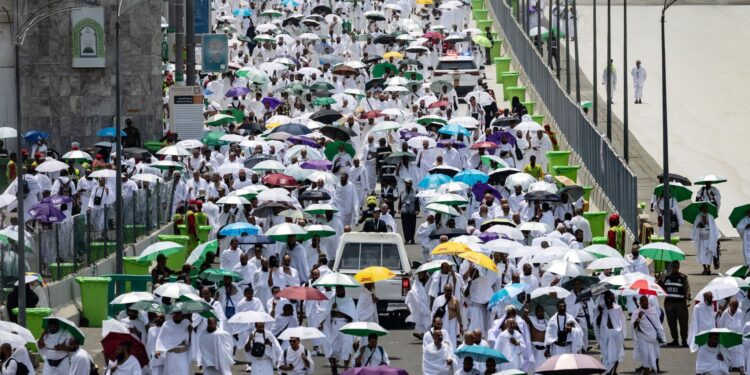This year’s Hajj pilgrimage has been marked by an unprecedented tragedy, with over 1,000 pilgrims losing their lives due to extreme heat in Mecca, Saudi Arabia. The gruelling nature of the pilgrimage, compounded by soaring temperatures, has once again highlighted the severe conditions faced by the faithful.
Rising Death Toll and Nationalities Affected
According to Arab diplomats coordinating their countries’ responses, at least 550 pilgrims have died, with 323 of them being Egyptians who succumbed to heat-related illnesses. The total death toll has now surpassed 1,000, with more than half of the victims being unregistered pilgrims who lacked access to cooler spaces provided for authorized participants.
Among the reported deaths, Egypt has been the hardest hit, with 658 Egyptians dying, 630 of whom were unregistered pilgrims. Other countries with significant casualties include Pakistan, with 58 deaths out of 150,000 pilgrims, and Indonesia, which recorded 183 deaths among its 240,000 pilgrims. Deaths have also been reported from Malaysia, India, Jordan, Iran, Senegal, Tunisia, Sudan, and Iraq’s autonomous Kurdistan region.
Extreme Heat and its Impact on Pilgrims
The Hajj, one of the five pillars of Islam, requires all Muslims with the means to complete it at least once in their lifetime. This year’s pilgrimage, which took place during the scorching Saudi summer, saw temperatures reach a staggering 51.8°C (125°F) at the Grand Mosque in Mecca. A recent Saudi study indicated that temperatures in the area where the rituals are performed are rising by 0.4°C each decade, making the pilgrimage increasingly challenging.
Saudi authorities had advised pilgrims to use umbrellas, drink plenty of water, and avoid exposure to the sun during the hottest parts of the day. However, many rituals, such as the prayers on Mount Arafat, require pilgrims to be outdoors for extended periods, exacerbating the risk of heat-related illnesses.
Challenges Faced by Unregistered Pilgrims
Each year, tens of thousands of pilgrims attempt to join the Hajj through irregular channels due to the high cost of official permits. This year, Saudi authorities reported removing hundreds of thousands of unregistered pilgrims from Mecca, but many still participated in the main rites. These unregistered pilgrims were more vulnerable to the extreme heat as they could not access the air-conditioned spaces reserved for the 1.8 million authorized pilgrims.
The exhaustion from evading security forces and the lack of access to cooling facilities led to severe health complications for many unregistered pilgrims. The primary cause of death among Egyptian pilgrims was heat-induced complications related to high blood pressure and other pre-existing conditions.
Response from Affected Countries
In response to the crisis, Egyptian officials have been visiting hospitals to gather information and assist Egyptian pilgrims in receiving medical care. The foreign ministry acknowledged the challenges posed by the large number of unregistered pilgrims, which has complicated the search for missing persons and the identification of deceased individuals.
Egyptian President Abdel Fatah al-Sisi has ordered the establishment of a crisis cell headed by the prime minister to follow up on the deaths of the country’s pilgrims. He emphasized the need for immediate coordination with Saudi authorities to facilitate the repatriation of the deceased and streamline the process.
Pakistan and Indonesia have also confirmed additional deaths among their pilgrims. Pakistani officials have described the fatalities as a natural consequence of the extreme weather conditions and the large number of participants.
Burial Process and Ongoing Search Efforts
Saudi authorities have begun the burial process for the deceased pilgrims, which involves cleaning the bodies, wrapping them in white burial cloth, and interring them according to their protocols. Diplomats from affected countries are working to notify families as best as they can, though the sheer number of victims makes this a daunting task.
The national meteorological center in Saudi Arabia reported over 2,700 cases of heat exhaustion on Sunday alone, underscoring the severe impact of the heat on the pilgrims. Last year, more than 300 deaths were reported during the Hajj, with the majority being Indonesians.
The tragedy of this year’s Hajj serves as a stark reminder of the harsh conditions faced by pilgrims and the urgent need for measures to protect them from the escalating effects of climate change.















